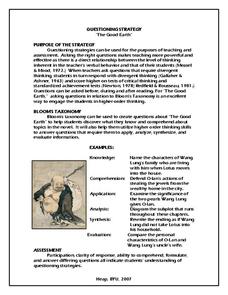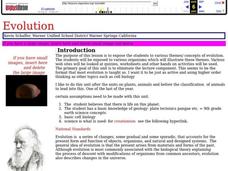Curated OER
Classification of Matter
In this classification of matter activity, students answer 15 questions about solids, liquids and gases, types of mixtures and compounds vs. elements. They also answer 2 questions about measurement and 1 question about a biome.
Curated OER
Spring
Students examine lichens in an outside field trip. Students explore the diversity of this organism and ask questions about them.
Curated OER
Systematics and the Phylogenetic Revolution
This assignment conducts a thorough exploration of systematics. Clearly designed for an AP biology course, questions pertain to taxonomic categories, phylogeny, and construction of cladograms.
Curated OER
The Old Man and the Sea: Questioning Strategies
Readers learn to ask questions about text with an activity based on Ernest Hemingway's The Old Man and the Sea. As they read, class members craft questions based on Bloom's Taxonomy and then find the answers themselves.
Curated OER
Unidentified (Flying?) Arthropods
Beginning biologists learn the characteristics of the five classes in the arthropod phylum. A student handout lists characteristics to help them identify five specimens. You will need to collect an example of each: arachnida, crustacea,...
Novelinks
The Good Earth: Questioning Strategy
Readers use Bloom's Taxonomy to create multi-level questions about Pearl Buck's The Good Earth.
Curated OER
Do Touch!
Students explore the sense of touch. They investigate unknown solids using the sense of touch. Pupils use their senses of touch to match feely gloves. Students explore body parts, by tracing their hands and feet on paper. They create a...
Curated OER
Introductory Bacteria and Virus Worksheet
Compare and contrast eukaryotes, prokaryotes, and viruses with a chart and a Venn diagram. Beginning microbiologists consider motility, reproductive ability, DNA content, and the presence of organelles. They write short answers to...
Curated OER
Evolution
Explore the concept of evolution and cell biology; your class can work in groups to use the internet to view websites on evolution, take a quiz, and complete a lab activity.
Curated OER
Tangerine: Cubing Strategy
Here's an activity that uses a reading comprehension strategy based on Bloom's taxonomy to focus readers' attention on key passages from Edward Bloor's Tangerine. Worthy of a place in your curriculum library.
Curated OER
Using Vegetation, Precipitation, and Surface Temperature to Study Climate Zones
Using NASA's Live Access Server, earth scientists compare the temperature, precipitation, and normalized difference vegetation index for four different locations. They use the data to identify the climate zone of each location using...
Novelinks
The Adventures of Tom Sawyer: Cubing Strategy
The toss of a die determines what questions your pupils will answer in this instructional activity. Learners respond to questions based on Bloom's taxonomy, discussing The Adventures of Tom Sawyer with classmates along the way. They...
Space Awareness
Coma Cluster of Galaxies
Scientists classify everything from the smallest cells to the largest galaxies, but how do they decide on a classification system? Scholars use 40 pictures of galaxies taken by the Hubble Space Telescope to sort and try creating their...
Illinois Department of Natural Resources
Section One: What is Biodiversity?
Four intriguing and scientific activities invite learners to explore the natural resources of their town. The activities cover concepts such as genetic traits, organizing species in a taxonomy, the differences between different species...
Cornell University
What is IPM?
Discover what a pest is and how to identify one with a lesson that looks closely at our outside world and taxonomy. Scholars investigate insects and plants to practice their identification skills, take a survey, and explore the...
Alabama Learning Exchange
What You Know About the Bermuda Triangle?
Get lost in the classifications. Using the backdrop of the Bermuda Triangle, pupils classify it by angle and side measures. They also learn information about the triangle and its history.
Biology Junction
Viruses, Viroids, and Prions
Are viruses living or non-living? According to the presentation, they are both and neither. Clearly, this requires clarification and an in-depth look at viruses, viroids, and prions. Young scientists learn about the history, structure,...
Curated OER
Local Animal Sort
Students examine the concepts of sorting and classifying animal. They use familiar animals to determine the connections between physical characteristics and categorization.
Manchester University
Where The Forest Meets The Sea
Join a father and his son as they explore an isolated location off the coast of Australia in the children's book Where the Forest Meets the Sea by Jeannie Baker. Engage young learners in reading this fun story with this series of...
Curated OER
Classified Information - Part 1: Shapes
Third graders investigate how and why scientists use classification. They discuss classification strategies using animals, and as a class fill in a flowchart with their responses. Next, in small groups they cut out a variety of shapes...
Curated OER
Classifying into Categories
In this classification worksheet, students organize their thoughts by classifying the words from the box into the following categories: birds, mammals, reptiles, and fish.
Curated OER
Recognition and Classification of Mixtures
Immerse your chemistry class in solutions! They melt and compare the mixtures that make up margarine, separate black ink into its component colors, distill ocean saltwater, and practice chromatography with plant pigments. There are eight...
Curated OER
Articles A /An and Noun Classification
In this singular nouns worksheet, students classify words as foods, animals, or occupations and write a/an before the nouns. Students list eleven words.
Curated OER
Animal Classification
Students watch video and slide shows as an introduction to animals. They discuss classifications of animals while moving from most common to least common of the animals. Types of classifications includes herbivores/carnivores;...
Other popular searches
- Taxonomy
- Bloom's Taxonomy
- Using Taxonomy
- Blooms Taxonomy
- Math Classification
- Animal Classifications
- Plant Classification
- Classifying Animals
- Classification of Animals
- Animal Kingdom
- Soil Classification
- Classification Keys

























